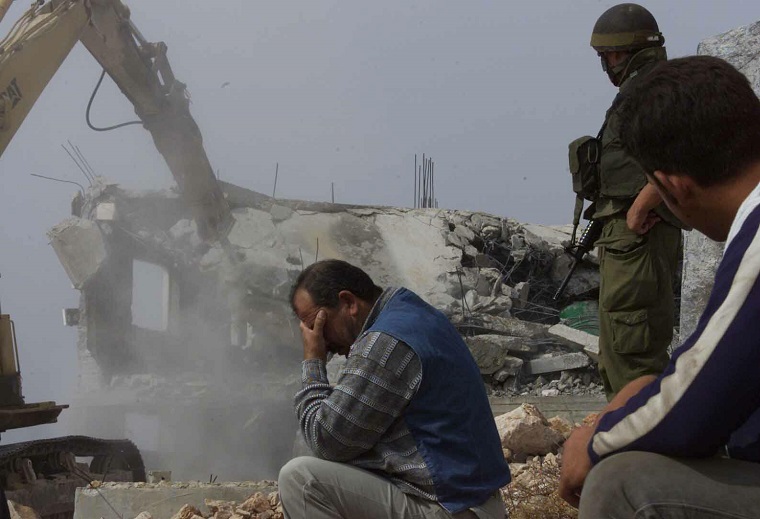
Israeli's home demolition policy has led to the destruction of thousands of Palestinian homes (like this one in Hebron in the West Bank) and the forced displacement of thousands of Palestinians. Carl Roose / AFSC
Tears streaming down her face, the little girl in front of me crawled over the ruins of her home looking for toys and school books that could be salvaged from among the rubble and destruction. The night before, the Israeli army had evacuated her family from their house, set explosives, and destroyed their home.
It was 2001, and it was the first time I witnessed the devastation wrought by Israel’s decades-old home demolition policy. During the nearly two decades since then, I’ve talked with hundreds of Palestinians who have been forced out of their homes by the Israeli government. Their stories are all unique, but the result of Israel’s home demolition and forced displacement policies is always the same–destruction and suffering within families and communities.
On June 28, 2021 the Jerusalem municipality began to destroy 100 Palestinian buildings, which are home to more than 1,500 Palestinians—63% of whom are children—to build a biblical theme park in the Al-Bustan neighborhood near the old city. In the neighborhood of Sheikh Jarrah, 169 residents, including 46 children, have recently received eviction notices. Their homes are to be turned over to Jewish Israeli settlers.
These demolitions and displacements are but one part of an apartheid system that discriminates against Palestinians living under Israeli control. For decades, the Jerusalem municipality and the Israeli authorities in the West Bank have refused to approve zoning plans for Palestinian areas of Jerusalem and communities in Area C of the West Bank. This refusal makes it impossible for Palestinian residents to obtain building permits, leaving them no choice but to build without permission.
There are now over 20,000 housing units built without permits in East Jerusalem, all of which are at risk of demolition, according to the Israeli human rights organization B’Tselem. At the same time, in the same neighborhoods from which Palestinian are being displaced, the Jerusalem municipality retroactively approves construction carried out by settler groups.
In the case of Sheikh Jarrah, the Israeli courts have ruled that Palestinian families who have lived in the neighborhood since the 1950s—when they were resettled in the area as refugees—must leave because settler groups claim that the land they live on was owned by Jews prior to 1948. The courts have given the settler groups claim to these lands, despite the fact that they have no historic links to the land. At the same time, Palestinians in Israel and the occupied Palestinian territory (including Jerusalem) who were displaced in 1948 are not allowed to return to their homes even when they hold ownership documents.
These forced displacements will not just traumatize families, they will destroy communities. During the seven years I lived and worked in the West Bank, I saw this happen over and over–and I documented the harmful impacts. In 2008, I received an update from the U.N. Office for the Coordination of Humanitarian Affairs that a home was being demolished in East Jerusalem, near the office where I worked. I traveled to the scene of the demolition and saw devastated family members break down as they watched the walls of their home fall.
At the time I was managing a program to assist Palestinian families whose homes were destroyed by Israel. Through our interviews with families, it became clear that the demolitions had deep, long-term negative impacts on family structures–increasing poverty and unemployment, raising levels of domestic violence, disrupting education, and leading to severe trauma for all those impacted.
The demolition of these buildings in Jerusalem is not unique. In the West Bank, tens of communities–including Umm Al-Khair, Susiya, and Khan al-Ahmar–remain under threat of complete destruction.
It's not accidental that the Israeli government continues to deny permits and refuses to pass development plans for Palestinian communities in Jerusalem and the 60% of the West Bank controlled by Israel. Limiting growth and restricting building guarantees Israeli control and pushes Palestinians out of areas desired for the building of settlements. The forced displacement of Palestinians from Al-Bustan, Sheikh Jarrah, and other neighborhoods to make room for settlers is part of a deliberate policy of discrimination that seeks to expel Palestinians from Jerusalem.
Action is needed to protect the families who may be forcibly displaced over the next weeks or months and the tens of thousands of Palestinians who risk losing their homes in the future. But action can’t simply be reactive.
The United States and the international community must oppose Israel’s home demolition policies and its ongoing occupation and denial of Palestinian rights. Cutting military aid, trade conditionality, and targeted sanctions can be effective tools to push for this change until there is freedom, justice, and equality for all people in Palestine and Israel. In the face of mass depopulation, words are not enough.
